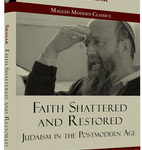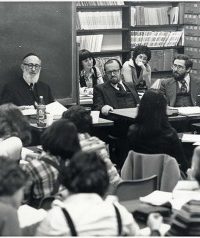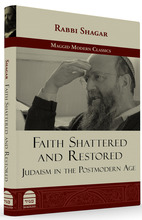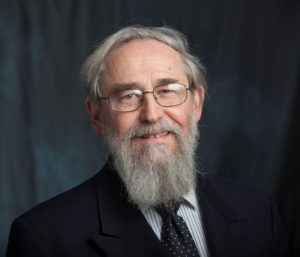The issue of how involved God is in our daily lives is both a deeply personal and a deeply philosophical question. When deciphering applications of Halakhah, one can look at the sources and come to a reasonable conclusion, but the issue of hashgahah peratit touches much more on faith than do questions of how to properly make tea on Shabbat. The traditional sources on hashgahah peratit offer a range of possibilities with few concrete answers, further complicating the picture. Nevertheless, the lack of an accepted unified conception of hashgahah perati allows individual preference and belief to play a role in this personal issue.
Hashgahah peratit can be divided into two categories: divine knowledge and divine governance. There is little to no dispute among Hazal about God’s omniscience, but the extent that God intervenes in worldly affairs is subject to much debate, especially in the potential conflict between free will and God’s will.
In Moreh Nevukhim 3:17, Rambam limits hashgahah peratit to humans alone. He writes that when a leaf falls off a tree or when a spider eats a fly, the fact that one leaf or fly was chosen over another is purely the result of chance, not a heavenly decree. Rambam also contends that “divine providence watches only over the individuals belonging to the human species and that in this species alone all the circumstances of the individuals and the good and evil that befall them are dependent upon their actions.”[i] The Sefer ha-Hinnukh adds that God has general providence, or hashgahah kelalit, over each species of animals, but has providence over each individual human, known as hashgahah peratit. The Sefer ha-Hinnukh writes this in the context of tsara’at,[ii] explaining that one of the reasons for tsara’at’s existence is to instill in us an awareness of God’s providence over every individual.[iii]
The idea that hashgahah peratit does not apply to animals seems to be in conflict with Hullin 63a and Bereshit Rabbah 79:6. In Hullin 63a, it is recounted that when R. Yohanan would see a shalakh bird he would exclaim, “Your judgments are as great as the sea.”[iv] Rashi explains that R. Yohanan means that God sends the shalakh bird to swoop down into the sea and kill fish prescribed for death. While Rashi’s reading is one way to understand this Gemara, one could argue that R. Yohanan was only making a statement about God’s judgments of humans, using the shalakh bird only as a metaphor. Even according to Rashi’s reading, R. Yohanan may have only been referring to hashgahah kelalit for the fish. God’s hashgahah over the fish may lead Him to send the shalakh birds to indiscriminately eat some of the fish. God does not care which fish lives or dies – He only cares that a certain number die. Nevertheless, Rashi’s reading is very plausible, providing a source for God’s hashgahah peratit extending to animals.
Bereshit Rabbah 79:6 provides another possible source for hashgahah peratit over animals. The Midrash recounts the story of R. Shim’on ben Yohai and his son hiding in a cave for thirteen years to escape persecution. When they exited the cave they saw a person hunting birds. When a heavenly voice would say, “Free, free,” the bird would escape, but when the heavenly voice would say, “Death,” the bird would be captured. R. Shim’on stated based on this that if a bird is not captured without a divine decree, a person is certainly not harmed without a divine decree. This source is quoted by the Vilna Ga’on in his commentary on the Zohar, Yahel Or, as a support for the idea that God exercises hashgahah peratit even on animals.[v]
In his book Hashgachah Pratis, R. Aryeh Leibowitz quotes this midrash and previous sages who used it to claim that God has hashgahah peratit for animals, but offers two other possible readings of the midrash. He writes, “The supposed individual divine providence for this bird may not have been on account of the bird itself as an individual, but perhaps on account of the hunter as an individual.”[vi] This is the opinion of R. David Luria, the Radal (d. 1855), who R. Leibowitz quotes in support for his alternate reading. Radal also suggests that, “The heavenly decree was not on account of the bird at all but to instruct R. Shimon to leave the cave.”[vii] It may be that there is hashgahah peratit for animals, but these sources have been read both ways.
The question of whether or not God has providence over animals is more of a philosophical question than one that directly affects how people lead their lives; nevertheless, this discussion lays some of the groundwork for the question of God’s providence over humans and places some of the first limitations on this idea of divine governance. Without looking closely at the sources, one might assume Hazal believed that God governs every aspect of the world, without realizing the extensive debate on the issue.
Some sages are of the opinion that hashgahah peratit does not even apply to all people. In his commentary to Vayikra 13:47, Seforno writes that hashgahah peratit has to be earned, and only those who walk in God’s ways, those of “kindness, truth… righteousness, and justice,”[viii] will merit hashgahah peratit. Everyone else is left to chance. Ramban arrives at a similar conclusion in his commentary to Bereshit 18:19.[ix]
Unlike Seforno and Ramban, who argue that only the righteous merit hashgahah peratit, Rambam writes that the level of providence is proportional to a person’s deeds, and only the completely wicked do not merit God’s attention. In Moreh Nevukhim 3:18, after arguing that hashgahah peratit for the righteous is proportional to their good deeds, Rambam writes, “For the ignorant and disobedient, their state is despicable proportionately to their lack of this overflow [of divine intellect], and they have been relegated to the rank of individuals of all other species of animals.”[x] Rambam quotes the verse in Tehillim 49:13, “He is like the beasts that speak not.” Most people who sin have redeeming qualities that would merit some form of hashgahah, but those who are completely sinful are treated as animals and are ignored by God. They are not even worthy of punishment – they are simply ignored.
Rambam claims in Moreh Nevukhim 3:51, regarding a person on the opposite end of the spectrum, “If a man’s thought is free from distraction, if he apprehends Him, may He be exalted, in the right way and rejoices in what he apprehends, that individual can never be afflicted with evil of any kind.”[xi] Considering all the terrible things that have befallen righteous people at the hands of evildoers, this is hard to accept, but perhaps no one truly has God in his mind at all times without any distractions. Perhaps Rambam is presenting an ideal to strive for, rather than an existing reality.
After addressing the issue of levels of divine providence for different types of people, the question of what constitutes an expression of God’s hashgahah arises. Two Talmudic sources on hashgahah peratit imply that God’s providence extends even to trivial human matters. In Hullin 7b it is stated that a person doesn’t even stub his toe without a heavenly decree. This would seem to contradict the idea espoused by multiple Rishonim that only the righteous merit hashgahah peratit. Perhaps only the righteous merit divine intervention to save them, but all people can be punished by God in this world as an expression of His hashgahah peratit. Similar opinions are raised in a discussion about the extent of divinely ordained suffering in Arakhin 16b, such as when a person has a garment woven for him but it doesn’t fit, or when a person means to take out three coins but pulls out two instead. While these minor inconveniences may be expressions of divine punishment, it is also possible that only some are, while others are mere coincidence.
There is also much discussion on the potential conflict between free will and God’s providence. If God wishes to protect certain people, does that limit the free will of others to harm them? It would seem that the more hashgahah peratit there is, the less free will there is, and vice versa.
In the eighth chapter of his Shemonah Perakim, Rambam addresses an aspect of this difficulty. He discusses the importance of free will, and how there can be no reward or punishment if people are not in control of their actions. He quotes the Talmudic axiom, “All is in the hands of Heaven, except for the fear of Heaven,”[xii] as a possible contradiction to the idea of free will, but claims that “all” only refers to “natural phenomena that are not influenced by the will of man, such as a person’s height, the weather, [and] the environment.” [xiii] With the exception of these external circumstances, people have control over their actions.
Rambam addresses the issue much more directly in the same eighth chapter with the following situation: If one person stole money from another, and God supposedly decreed for the robber to gain the money and the victim to lose the money, then God would be decreeing sin, which cannot possibly be the case. Rather, man has complete control over all of his actions. God may still intercede on someone’s behalf, but gives man free will to act as he chooses.
There are those who dispute this idea that man can act without a divine decree. In his Hovot ha-Levavot, R. Bahya ben Yosef ibn Paquda writes, “No one can benefit or harm himself or another without God’s consent.”[xiv] This idea, that all human actions are decreed by God, raises the question of how there can be reward or punishment in such a system.
R. Avraham ben ha-Rambam addresses this difficulty in his comments on Shemot 21:13 with the example of the murderer. He writes that no one can be murdered without a divine decree. The murderer is punished because God did not force the specific murderer to kill this man – He decreed that someone would murder him. This view is also attributed to the Vilna Ga’on in a letter of R. Yosef Zundel of Salant. He argues that when God decrees that a non-human will do harm to a human, He decrees which specific creation will do the harm; however, when God decrees that a human will be harmed by another human, He does not decree which specific free-willed person will act. Furthermore, if there is no divine decree against that person, no one can do him any harm.
This view of R. Avraham ben ha-Rambam and the Vilna Ga’on, among others, is in accordance with a story in Ta’anit 18b. When Turyanus sought to kill brothers Lulyanus and Pappus, he said to them that their god should come and save them. They replied that God sentenced them to death and they were not worthy of redemption. He placed them in Turyanus’s hands so that Turyanus could be punished for killing them. They said, “God has many executioners at His disposal, and God has many bears and lions in His world that can attack and kill us.” Because God did not decree who should kill them, Turyanus is still culpable for his actions.
* * *
In his book “The Basics of Deed and Creed,” R. Benjamin Blech observes that Judaism is much more a religion of deed than of creed, of actions more than doctrine.[xv] The extensive debate among Jewish scholars about the extent of hashgahah peratit supports this view of the nature of Jewish creed. The question of how involved God is in the world should be central to our belief system, but it is not addressed explicitly in the Torah, leading to many divergent opinions on the issue.
I prefer it that way. I am glad there is not a uniform answer to this question. No one can truly understand the ways of God, and different conceptions of God’s role in the world may appeal to different people. I am personally comfortable with the idea that God has hashgahah peratit over humans, hashgahah kelalit over non-humans, and that people can benefit or be harmed without a divine decree. God may intercede on occasion, but I do not believe each time something good or bad happens it was necessarily decreed by heaven.
Others may rightfully contend that nothing can happen without a divine decree, but this view can lead to some troubling conclusions. In Sefer Hassidim, attributed to R. Yehudah he-Hassid, the issue of how to respond to misfortune is addressed. It is written there that people should ascribe sickness, physical harm at the hand of others, and city-wide disaster to God.[xvi] These personal misfortunes can be taken as a wakeup call to repent, but it is deeply troubling when people interpret other’s misfortunes as divine punishment. This has been the case after natural disasters, such as after Hurricane Katrina when a prominent rabbi stated that God sent the hurricane to punish the godless people of New Orleans, and in response to the Bush administration’s decision to support the Israeli withdrawal from Gush Katif. Similar insensitive, perverse reasons have been given for tragedies as massive as the Holocaust.
These opinions may be fringe views, but when one believes that every single thing is ordained by God and that God is just, one may think it reasonable to figure out why God would orchestrate suffering on such a large scale. I believe it may be proper to look inward in times of tragedy, but to use the misfortune of others as proof of their misconduct is wrong. It is unfortunate that a legitimate view in Jewish philosophy has led to such warped and insensitive conclusions.
Ultimately, each individual’s relationship with God is personal. I am more comfortable believing that my actions are known by God but are not pre-ordained. I do not believe every minor success or misfortune is ordained by God as a reward or punishment, but the larger tragedies open up questions of theodicy for which I do not have the answers. In terms of the extent of hashgahah peratit, the sources support a range of possibilities, but only God knows the true answers.
Nathan Denicoff is sophomore at YC majoring in Biology.
[i] Moreh Nevukhim 3:17, trans. by Shlomo Pines (modified). (Chicago, Il: University of Chicago Press, 1974).
[ii] For an explanation of tsara’at, see Leviticus 13-14.
[iii] Sefer ha-Hinnukh 169.
[v] Yahel Or, Shelah 157b.
[vi] Aryeh Leibowitz, Hashgachah Pratis (Southfield, MI: Targum Press, Inc., 2009).
[vii] Radal on Bereshit Rabbah 79:6, trans. by Aryeh Leibowitz.
[viii] Seforno on Vayikra 13:47, translation mine.
[ix] Ramban on Bereshit 18:19.
[x] Moreh Nevukhim 3: 18, trans. by Shlomo Pines. (Chicago, Il: University of Chicago Press, 1974).
[xi] Moreh Nevukhim 3:51, trans. by Shlomo Pines (modified). (Chicago, Il: University of Chicago Press, 1974).
[xiii] Shemonah Perakim Chapter 8, trans. by Avraham Yaakov Finkel. (Scranton, PA: Yeshivath Beth Moshe, 1994).
[xiv] Hovot ha-Levavot Chapter 3, my translation.
[xv] Benjamin Blech, Understanding Judaism: The Basics of Deed and Creed (Northvale, NJ: Jason Aronson, Inc., 1992).
[xvi] Sefer Hassidim 751.











Divine Providence: Godly Manifestations, and Human Uses and Misuses
The issue of how involved God is in our daily lives is both a deeply personal and a deeply philosophical question. When deciphering applications of Halakhah, one can look at the sources and come to a reasonable conclusion, but the issue of hashgahah peratit touches much more on faith than do questions of how to properly make tea on Shabbat. The traditional sources on hashgahah peratit offer a range of possibilities with few concrete answers, further complicating the picture. Nevertheless, the lack of an accepted unified conception of hashgahah perati allows individual preference and belief to play a role in this personal issue.
Hashgahah peratit can be divided into two categories: divine knowledge and divine governance. There is little to no dispute among Hazal about God’s omniscience, but the extent that God intervenes in worldly affairs is subject to much debate, especially in the potential conflict between free will and God’s will.
In Moreh Nevukhim 3:17, Rambam limits hashgahah peratit to humans alone. He writes that when a leaf falls off a tree or when a spider eats a fly, the fact that one leaf or fly was chosen over another is purely the result of chance, not a heavenly decree. Rambam also contends that “divine providence watches only over the individuals belonging to the human species and that in this species alone all the circumstances of the individuals and the good and evil that befall them are dependent upon their actions.”[i] The Sefer ha-Hinnukh adds that God has general providence, or hashgahah kelalit, over each species of animals, but has providence over each individual human, known as hashgahah peratit. The Sefer ha-Hinnukh writes this in the context of tsara’at,[ii] explaining that one of the reasons for tsara’at’s existence is to instill in us an awareness of God’s providence over every individual.[iii]
The idea that hashgahah peratit does not apply to animals seems to be in conflict with Hullin 63a and Bereshit Rabbah 79:6. In Hullin 63a, it is recounted that when R. Yohanan would see a shalakh bird he would exclaim, “Your judgments are as great as the sea.”[iv] Rashi explains that R. Yohanan means that God sends the shalakh bird to swoop down into the sea and kill fish prescribed for death. While Rashi’s reading is one way to understand this Gemara, one could argue that R. Yohanan was only making a statement about God’s judgments of humans, using the shalakh bird only as a metaphor. Even according to Rashi’s reading, R. Yohanan may have only been referring to hashgahah kelalit for the fish. God’s hashgahah over the fish may lead Him to send the shalakh birds to indiscriminately eat some of the fish. God does not care which fish lives or dies – He only cares that a certain number die. Nevertheless, Rashi’s reading is very plausible, providing a source for God’s hashgahah peratit extending to animals.
Bereshit Rabbah 79:6 provides another possible source for hashgahah peratit over animals. The Midrash recounts the story of R. Shim’on ben Yohai and his son hiding in a cave for thirteen years to escape persecution. When they exited the cave they saw a person hunting birds. When a heavenly voice would say, “Free, free,” the bird would escape, but when the heavenly voice would say, “Death,” the bird would be captured. R. Shim’on stated based on this that if a bird is not captured without a divine decree, a person is certainly not harmed without a divine decree. This source is quoted by the Vilna Ga’on in his commentary on the Zohar, Yahel Or, as a support for the idea that God exercises hashgahah peratit even on animals.[v]
In his book Hashgachah Pratis, R. Aryeh Leibowitz quotes this midrash and previous sages who used it to claim that God has hashgahah peratit for animals, but offers two other possible readings of the midrash. He writes, “The supposed individual divine providence for this bird may not have been on account of the bird itself as an individual, but perhaps on account of the hunter as an individual.”[vi] This is the opinion of R. David Luria, the Radal (d. 1855), who R. Leibowitz quotes in support for his alternate reading. Radal also suggests that, “The heavenly decree was not on account of the bird at all but to instruct R. Shimon to leave the cave.”[vii] It may be that there is hashgahah peratit for animals, but these sources have been read both ways.
The question of whether or not God has providence over animals is more of a philosophical question than one that directly affects how people lead their lives; nevertheless, this discussion lays some of the groundwork for the question of God’s providence over humans and places some of the first limitations on this idea of divine governance. Without looking closely at the sources, one might assume Hazal believed that God governs every aspect of the world, without realizing the extensive debate on the issue.
Some sages are of the opinion that hashgahah peratit does not even apply to all people. In his commentary to Vayikra 13:47, Seforno writes that hashgahah peratit has to be earned, and only those who walk in God’s ways, those of “kindness, truth… righteousness, and justice,”[viii] will merit hashgahah peratit. Everyone else is left to chance. Ramban arrives at a similar conclusion in his commentary to Bereshit 18:19.[ix]
Unlike Seforno and Ramban, who argue that only the righteous merit hashgahah peratit, Rambam writes that the level of providence is proportional to a person’s deeds, and only the completely wicked do not merit God’s attention. In Moreh Nevukhim 3:18, after arguing that hashgahah peratit for the righteous is proportional to their good deeds, Rambam writes, “For the ignorant and disobedient, their state is despicable proportionately to their lack of this overflow [of divine intellect], and they have been relegated to the rank of individuals of all other species of animals.”[x] Rambam quotes the verse in Tehillim 49:13, “He is like the beasts that speak not.” Most people who sin have redeeming qualities that would merit some form of hashgahah, but those who are completely sinful are treated as animals and are ignored by God. They are not even worthy of punishment – they are simply ignored.
Rambam claims in Moreh Nevukhim 3:51, regarding a person on the opposite end of the spectrum, “If a man’s thought is free from distraction, if he apprehends Him, may He be exalted, in the right way and rejoices in what he apprehends, that individual can never be afflicted with evil of any kind.”[xi] Considering all the terrible things that have befallen righteous people at the hands of evildoers, this is hard to accept, but perhaps no one truly has God in his mind at all times without any distractions. Perhaps Rambam is presenting an ideal to strive for, rather than an existing reality.
After addressing the issue of levels of divine providence for different types of people, the question of what constitutes an expression of God’s hashgahah arises. Two Talmudic sources on hashgahah peratit imply that God’s providence extends even to trivial human matters. In Hullin 7b it is stated that a person doesn’t even stub his toe without a heavenly decree. This would seem to contradict the idea espoused by multiple Rishonim that only the righteous merit hashgahah peratit. Perhaps only the righteous merit divine intervention to save them, but all people can be punished by God in this world as an expression of His hashgahah peratit. Similar opinions are raised in a discussion about the extent of divinely ordained suffering in Arakhin 16b, such as when a person has a garment woven for him but it doesn’t fit, or when a person means to take out three coins but pulls out two instead. While these minor inconveniences may be expressions of divine punishment, it is also possible that only some are, while others are mere coincidence.
There is also much discussion on the potential conflict between free will and God’s providence. If God wishes to protect certain people, does that limit the free will of others to harm them? It would seem that the more hashgahah peratit there is, the less free will there is, and vice versa.
In the eighth chapter of his Shemonah Perakim, Rambam addresses an aspect of this difficulty. He discusses the importance of free will, and how there can be no reward or punishment if people are not in control of their actions. He quotes the Talmudic axiom, “All is in the hands of Heaven, except for the fear of Heaven,”[xii] as a possible contradiction to the idea of free will, but claims that “all” only refers to “natural phenomena that are not influenced by the will of man, such as a person’s height, the weather, [and] the environment.” [xiii] With the exception of these external circumstances, people have control over their actions.
Rambam addresses the issue much more directly in the same eighth chapter with the following situation: If one person stole money from another, and God supposedly decreed for the robber to gain the money and the victim to lose the money, then God would be decreeing sin, which cannot possibly be the case. Rather, man has complete control over all of his actions. God may still intercede on someone’s behalf, but gives man free will to act as he chooses.
There are those who dispute this idea that man can act without a divine decree. In his Hovot ha-Levavot, R. Bahya ben Yosef ibn Paquda writes, “No one can benefit or harm himself or another without God’s consent.”[xiv] This idea, that all human actions are decreed by God, raises the question of how there can be reward or punishment in such a system.
R. Avraham ben ha-Rambam addresses this difficulty in his comments on Shemot 21:13 with the example of the murderer. He writes that no one can be murdered without a divine decree. The murderer is punished because God did not force the specific murderer to kill this man – He decreed that someone would murder him. This view is also attributed to the Vilna Ga’on in a letter of R. Yosef Zundel of Salant. He argues that when God decrees that a non-human will do harm to a human, He decrees which specific creation will do the harm; however, when God decrees that a human will be harmed by another human, He does not decree which specific free-willed person will act. Furthermore, if there is no divine decree against that person, no one can do him any harm.
This view of R. Avraham ben ha-Rambam and the Vilna Ga’on, among others, is in accordance with a story in Ta’anit 18b. When Turyanus sought to kill brothers Lulyanus and Pappus, he said to them that their god should come and save them. They replied that God sentenced them to death and they were not worthy of redemption. He placed them in Turyanus’s hands so that Turyanus could be punished for killing them. They said, “God has many executioners at His disposal, and God has many bears and lions in His world that can attack and kill us.” Because God did not decree who should kill them, Turyanus is still culpable for his actions.
* * *
In his book “The Basics of Deed and Creed,” R. Benjamin Blech observes that Judaism is much more a religion of deed than of creed, of actions more than doctrine.[xv] The extensive debate among Jewish scholars about the extent of hashgahah peratit supports this view of the nature of Jewish creed. The question of how involved God is in the world should be central to our belief system, but it is not addressed explicitly in the Torah, leading to many divergent opinions on the issue.
I prefer it that way. I am glad there is not a uniform answer to this question. No one can truly understand the ways of God, and different conceptions of God’s role in the world may appeal to different people. I am personally comfortable with the idea that God has hashgahah peratit over humans, hashgahah kelalit over non-humans, and that people can benefit or be harmed without a divine decree. God may intercede on occasion, but I do not believe each time something good or bad happens it was necessarily decreed by heaven.
Others may rightfully contend that nothing can happen without a divine decree, but this view can lead to some troubling conclusions. In Sefer Hassidim, attributed to R. Yehudah he-Hassid, the issue of how to respond to misfortune is addressed. It is written there that people should ascribe sickness, physical harm at the hand of others, and city-wide disaster to God.[xvi] These personal misfortunes can be taken as a wakeup call to repent, but it is deeply troubling when people interpret other’s misfortunes as divine punishment. This has been the case after natural disasters, such as after Hurricane Katrina when a prominent rabbi stated that God sent the hurricane to punish the godless people of New Orleans, and in response to the Bush administration’s decision to support the Israeli withdrawal from Gush Katif. Similar insensitive, perverse reasons have been given for tragedies as massive as the Holocaust.
These opinions may be fringe views, but when one believes that every single thing is ordained by God and that God is just, one may think it reasonable to figure out why God would orchestrate suffering on such a large scale. I believe it may be proper to look inward in times of tragedy, but to use the misfortune of others as proof of their misconduct is wrong. It is unfortunate that a legitimate view in Jewish philosophy has led to such warped and insensitive conclusions.
Ultimately, each individual’s relationship with God is personal. I am more comfortable believing that my actions are known by God but are not pre-ordained. I do not believe every minor success or misfortune is ordained by God as a reward or punishment, but the larger tragedies open up questions of theodicy for which I do not have the answers. In terms of the extent of hashgahah peratit, the sources support a range of possibilities, but only God knows the true answers.
Nathan Denicoff is sophomore at YC majoring in Biology.
[i] Moreh Nevukhim 3:17, trans. by Shlomo Pines (modified). (Chicago, Il: University of Chicago Press, 1974).
[ii] For an explanation of tsara’at, see Leviticus 13-14.
[iii] Sefer ha-Hinnukh 169.
[iv] Psalms 36:7.
[v] Yahel Or, Shelah 157b.
[vi] Aryeh Leibowitz, Hashgachah Pratis (Southfield, MI: Targum Press, Inc., 2009).
[vii] Radal on Bereshit Rabbah 79:6, trans. by Aryeh Leibowitz.
[viii] Seforno on Vayikra 13:47, translation mine.
[ix] Ramban on Bereshit 18:19.
[x] Moreh Nevukhim 3: 18, trans. by Shlomo Pines. (Chicago, Il: University of Chicago Press, 1974).
[xi] Moreh Nevukhim 3:51, trans. by Shlomo Pines (modified). (Chicago, Il: University of Chicago Press, 1974).
[xii] Berakhot 33b.
[xiii] Shemonah Perakim Chapter 8, trans. by Avraham Yaakov Finkel. (Scranton, PA: Yeshivath Beth Moshe, 1994).
[xiv] Hovot ha-Levavot Chapter 3, my translation.
[xv] Benjamin Blech, Understanding Judaism: The Basics of Deed and Creed (Northvale, NJ: Jason Aronson, Inc., 1992).
[xvi] Sefer Hassidim 751.